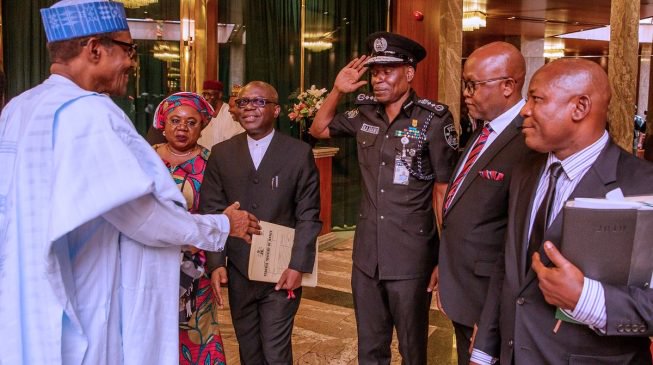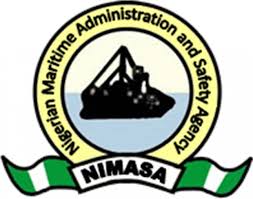The presidential panel on the reform of special anti-robbery squad (SARS) has recommended the establishment of state and local government police to tackle the rising insecurity in the country.
This is part of the recommendations contained in the report submitted to President Muhammadu Buhari at the presidential villa in Abuja on Monday.
The President, in response, gave the Inspector-General of Police, Ministry of Justice and National Human Rights Commission three months to work out the modalities for the implementation of the report of the Presidential Panel on the Reform of the Special Anti-Robbery Squad.
The panel, which was chaired by the Executive Secretary of the NHRC, Mr Tony Ojukwu, had in conjunction with the commission, investigated allegations of human rights violations by SARS.
The panel, chaired by Tony Ojukwu, executive secretary of the National Human Rights Commission, was constituted as a result of public outcry on the “human rights violations perpetrated by officers and men of SARS”.
The panel also recommended for a significant improvement in the funding, kitting and facilities of the police force, and strengthening of the information and communication technology of the force.
It called for the institutionalising of a special investigation panel to annually hear and determine complaints on alleged human rights violations against operations of the police.
The panel also recommended that SARS should be renamed Anti-Robbery Section and should operate under the Intelligence Unit of the Nigeria Police as it was hitherto.
Panel recommends dismissal of 37 police officers, prosecution of 24 others
The panel recommended the dismissal of 37 police accused of violating the rights of Nigerians from service and the prosecution of 24 others for abuses.
Another recommendation was that the Inspector-General of Police, Mr Mohammed Adamu, should fish out 22 other officers accused of violating the rights of citizens.
It also asked the Nigeria Police to pay compensation to 45 complainants, in addition to tendering public apologies and complying with court orders in 10 separate cases.
While receiving the report, the President said, “I want to thank the panel once more, and hereby direct that since the recommendations of the commission that constituted the panel are enforceable as decisions of the court, that the Inspector-General of Police and the Solicitor General of the Federation/Permanent Secretary, Federal Ministry of Justice, should meet with the commission to work out the modalities for the implementation of the report within three months from today.”
Buhari said he was happy that finally a full investigation had been conducted into the alleged abuses by SARS.
According to him, the recommendations would help assuage the pains suffered by the victims and make the police work better.
He further said, “I believe that the report of the panel and recommendations contained therein would go a long way in redressing the grievances of the complainants, ensure accountability on the part of the police officers in discharging their responsibilities and facilitate the various police reforms being introduced by this administration.
“I want to assure you and all Nigerians that this administration will continue to fulfil its obligations of promoting and protecting human rights of Nigerians, and will give the National Human Rights Commission all the support required to ensure full implementation of the recommendations contained in its report.
“In addition, we will strengthen the operations of the commission to enhance its effectiveness and capability to resolve cases of human rights violations.
“This administration is conscious of the role the commission plays in ensuring security and stability in the nation through the resolution of complaints of human rights violations, which if neglected, could result into major security challenges.
“As you are aware, I have recently approved the re-constitution of the governing council of the commission. The names of the council members will be submitted to the National Assembly for confirmation before the inauguration of the council in line with NHRC Act, 1995 (as amended).”
Ojukwu had realier in his remarks said that the panel which received Buhari’s directive on August 14, 2018 received “113 complaints on alleged human rights violations from across the country and 22 memorandums suggesting how to reform and restructure SARS and the Nigeria Police in general.”
He said that the panel held sittings in the six geopolitical zones to give both the complainants and police the opportunity to make presentations.
Ojukwu said, “At the end of its public hearing and having listened to complaints as well as defendants and their counsel, the panel recommended 37 police officers for dismissal from the force.
“Twenty-four were recommended for prosecution. The panel also directed the Inspector-General of Police to unravel the identity of 22 officers involved in the violation of the human rights of innocent citizens.
“The police were directed to pay compensation to various 45 complaints and tender public apologies in five complaints and directed to obey court orders in five matters.
“The police were directed to immediately arrest and prosecute two retired senior officers found to have violated the rights of citizens (one for extrajudicial killing and the other for illegal takeover of property of a suspect). The panel also recovered two vehicles illegally auctioned by SARS and returned them to their owner.”
“Significant improvement in the funding, kitting and facilities of the Nigeria Police Force; strengthening Information and Communication Technology of the force; establishment of state and local government police; and institutionalising a Special Investigation Panel to annually hear and determine complaints on alleged human rights violations against operations of the Nigeria Police Force were also recommended.”














